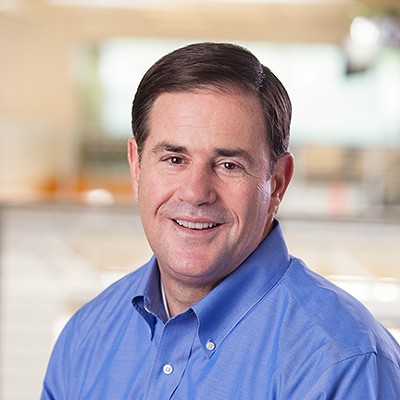Wednesday, February 17, 2016
Decoding Ducey-Speak on Education Funding
To prepare for my visit to the Bill Buckmaster Show Wednesday, I listened to Gov. Ducey talking with Buckmaster Tuesday, then listened a second time on the show's website, taking notes. Here are some of the things Ducey said, along with what lies hidden an inch behind his words.
Buckmaster asked Ducey about the upcoming vote to restore most of the JTED funding. Ducey said he was ready to sign the finished bill because "I'm supportive of JTED." In fact, Ducey pushed for the $30 million cut to JTED in the last budget, which doesn't sound very supportive. He explained the cut to Buckmaster by saying he faced a billion dollar deficit and had to make difficult decisions, but added in a classic moment of political doublespeak that he protected K-12 education in the budget. You're not protecting K-12 education when you make cuts to JTED which would have decimated the program if they weren't reversed.
As for being "supportive of JTED," in fact, Ducey proposed $30 million for JTED spread over three years, $10 million a year, for this year's budget. The money would have been used as matching funds to grants from businesses for programs they thought would help train future employees. By most accounts, his proposal would have effectively ended JTED. It was only when Republicans joined with Democrats and created a veto-proof majority for a bill reinstating JTED funds that Ducey discovered how much he supported the program.
In another statement emphasizing his support for education, Ducey said, "We're putting $106 million additional into K-12 education." In fact, half of what Ducey is taking credit for is mandatory funding based on inflation and an increase in student population. That's stay-even money, not an increase.
Next, Ducey moved on to more of his ritual back patting, praising himself for the money that will flow to schools if voters approve Proposition 123—money that's 70 percent of what the state owes the schools based on a proposition approved by voters in 2000 along with a current court order. He went all soft and squishy about school leadership as he talked about those wonderful principals and superintendents who will decide how to spend the Prop 123 money. According to Ducey, they should "have the flexibility to use the additional dollars . . . to make the decisions that are best for that school." Let it go into technology or salaries or classroom supplies or ELL, Ducey said. It's all fine with him.
But it's worth remembering that our born-again education governor headed the campaign against Proposition 204 that would have levied a one cent sales tax to add almost a billion dollars to K-12 funding. More accurately, it would have continued a tax that began during Gov. Brewer's tenure, which she supported. In his anti-Prop 204 days, one of Ducey's main arguments against the funding was that it would be given to superintendents and principals—he called them "unelected and unaccountable bureaucrats" back then—who could spend it any way they pleased. He wrote, "Anyone who READS Prop 204 will see NO MONEY goes to children's educations." His claim was, he wasn't against spending the money on education. He was against the money going to the schools without any stipulations about how the money would be spent. Now with Prop 123, he's all for those same "unelected and unaccountable bureaucrats" having the "flexibility to use the additional dollars . . . to make the decisions that are best for that school." Why the difference? Prop 204 was funded by a tax, and Prop 123 won't need any new taxes since most of the money is drawn from the students' state land trust fund. Ducey wants tax cuts for his wealthy supporters. Any tax increases are supposed to happen at the local level without his fingerprints on them, increases necessary to make up for the state's spending cuts to cities and counties.
It deserves repeating yet again: Ducey is not a pro-education governor or a pro-child governor. He has it in his power to push for more adequate funding for our schools that goes beyond replacing 70 percent of what was stolen from the students in 2009, but he's simply not interested.
Buckmaster asked Ducey about the upcoming vote to restore most of the JTED funding. Ducey said he was ready to sign the finished bill because "I'm supportive of JTED." In fact, Ducey pushed for the $30 million cut to JTED in the last budget, which doesn't sound very supportive. He explained the cut to Buckmaster by saying he faced a billion dollar deficit and had to make difficult decisions, but added in a classic moment of political doublespeak that he protected K-12 education in the budget. You're not protecting K-12 education when you make cuts to JTED which would have decimated the program if they weren't reversed.
As for being "supportive of JTED," in fact, Ducey proposed $30 million for JTED spread over three years, $10 million a year, for this year's budget. The money would have been used as matching funds to grants from businesses for programs they thought would help train future employees. By most accounts, his proposal would have effectively ended JTED. It was only when Republicans joined with Democrats and created a veto-proof majority for a bill reinstating JTED funds that Ducey discovered how much he supported the program.
In another statement emphasizing his support for education, Ducey said, "We're putting $106 million additional into K-12 education." In fact, half of what Ducey is taking credit for is mandatory funding based on inflation and an increase in student population. That's stay-even money, not an increase.
Next, Ducey moved on to more of his ritual back patting, praising himself for the money that will flow to schools if voters approve Proposition 123—money that's 70 percent of what the state owes the schools based on a proposition approved by voters in 2000 along with a current court order. He went all soft and squishy about school leadership as he talked about those wonderful principals and superintendents who will decide how to spend the Prop 123 money. According to Ducey, they should "have the flexibility to use the additional dollars . . . to make the decisions that are best for that school." Let it go into technology or salaries or classroom supplies or ELL, Ducey said. It's all fine with him.
But it's worth remembering that our born-again education governor headed the campaign against Proposition 204 that would have levied a one cent sales tax to add almost a billion dollars to K-12 funding. More accurately, it would have continued a tax that began during Gov. Brewer's tenure, which she supported. In his anti-Prop 204 days, one of Ducey's main arguments against the funding was that it would be given to superintendents and principals—he called them "unelected and unaccountable bureaucrats" back then—who could spend it any way they pleased. He wrote, "Anyone who READS Prop 204 will see NO MONEY goes to children's educations." His claim was, he wasn't against spending the money on education. He was against the money going to the schools without any stipulations about how the money would be spent. Now with Prop 123, he's all for those same "unelected and unaccountable bureaucrats" having the "flexibility to use the additional dollars . . . to make the decisions that are best for that school." Why the difference? Prop 204 was funded by a tax, and Prop 123 won't need any new taxes since most of the money is drawn from the students' state land trust fund. Ducey wants tax cuts for his wealthy supporters. Any tax increases are supposed to happen at the local level without his fingerprints on them, increases necessary to make up for the state's spending cuts to cities and counties.
It deserves repeating yet again: Ducey is not a pro-education governor or a pro-child governor. He has it in his power to push for more adequate funding for our schools that goes beyond replacing 70 percent of what was stolen from the students in 2009, but he's simply not interested.
Tags: Doug Ducey , Bill Buckmaster , JTED , Education funding , Jan Brewer














